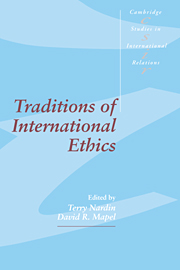Book contents
- Frontmatter
- Contents
- Contributors
- Preface
- 1 ETHICAL TRADITIONS IN INTERNATIONAL AFFAIRS
- 2 THE TRADITION OF INTERNATIONAL LAW
- 3 THE DECLARATORY TRADITION IN MODERN INTERNATIONAL LAW
- 4 CLASSICAL REALISM
- 5 TWENTIETH-CENTURY REALISM
- 6 NATURAL LAW AND INTERNATIONAL ETHICS
- 7 KANT'S GLOBAL RATIONALISM
- 8 UTILITARIANISM AND INTERNATIONAL ETHICS
- 9 THE CONTRACTARIAN TRADITION AND INTERNATIONAL ETHICS
- 10 LIBERALISM AND INTERNATIONAL REFORM
- 11 MARXISM AND INTERNATIONAL ETHICS
- 12 THE IDEA OF RIGHTS IN INTERNATIONAL ETHICS
- 13 BIBLICAL ARGUMENT IN INTERNATIONAL ETHICS
- 14 CONVERGENCE AND DIVERGENCE IN INTERNATIONAL ETHICS
- Index
- Titles in the series
11 - MARXISM AND INTERNATIONAL ETHICS
Published online by Cambridge University Press: 15 September 2009
- Frontmatter
- Contents
- Contributors
- Preface
- 1 ETHICAL TRADITIONS IN INTERNATIONAL AFFAIRS
- 2 THE TRADITION OF INTERNATIONAL LAW
- 3 THE DECLARATORY TRADITION IN MODERN INTERNATIONAL LAW
- 4 CLASSICAL REALISM
- 5 TWENTIETH-CENTURY REALISM
- 6 NATURAL LAW AND INTERNATIONAL ETHICS
- 7 KANT'S GLOBAL RATIONALISM
- 8 UTILITARIANISM AND INTERNATIONAL ETHICS
- 9 THE CONTRACTARIAN TRADITION AND INTERNATIONAL ETHICS
- 10 LIBERALISM AND INTERNATIONAL REFORM
- 11 MARXISM AND INTERNATIONAL ETHICS
- 12 THE IDEA OF RIGHTS IN INTERNATIONAL ETHICS
- 13 BIBLICAL ARGUMENT IN INTERNATIONAL ETHICS
- 14 CONVERGENCE AND DIVERGENCE IN INTERNATIONAL ETHICS
- Index
- Titles in the series
Summary
The nature of Marxism poses many problems to the student of ethical traditions in international relations. Neither “ethics” nor “international relations” are notions that sit easily within a Marxist framework, while the notion of Marxism as a tradition is, itself, suspect. Marxist notions of ethics and international relations will be the main subject of this chapter but, before these issues can be addressed, we must define the primary term, Marxism. What this involves is not the hopeless task of trying to identify the essentials of Marxism, but the more modest ambition of setting out a checklist of contemporary “live” political doctrines that can claim with some plausibility to be Marxist, along with a sense of their origins.
What is Marxism?
Approaching this latter task first, we can identify three stages in the political and doctrinal evolution of Marxism, described by Kolakowski as the periods of the Founders, of the Golden Age, and of the Breakdown (Kolakowski 1978). The major doctrines associated with the names of Marx and Engels – the Founders – emerged in the middle decades of the nineteenth century, and are to be found in The German Ideology, The Communist Manifesto, and Capital, vol. I (McLellan 1977; Marx [1867] 1976). These doctrines were a major inspiration of the socialist movements that came together under the banner of the (Second) International in the quarter century prior to the First World War – the Golden Age.
- Type
- Chapter
- Information
- Traditions of International Ethics , pp. 225 - 249Publisher: Cambridge University PressPrint publication year: 1992
- 6
- Cited by



